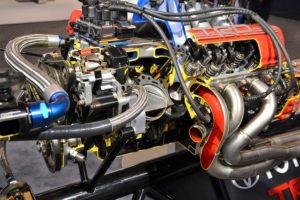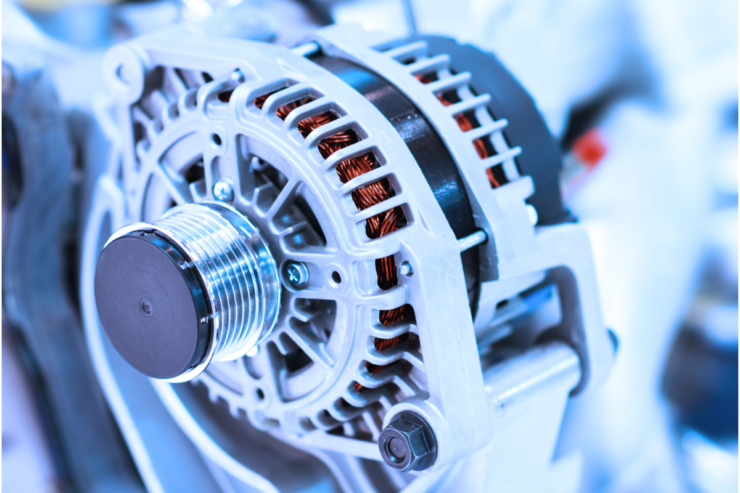Toyota has long been known as a company with a thirst for cutting-edge technology. With a large market share in both foreign and domestic markets, their drive for innovation has made them a fan favorite in the motorsports industry and among car aficionados. Their latest product, a high-performance hydrogen engine that re-invents the internal combustion engine without the pollution and pitfalls of the traditional engine is no exception.
Why Hydrogen
 Hydrogen is one of the few fuels that can burn in a traditional manner but be carbon neutral. This means that modifications to existing technology, rather than the invention of all new technologies, can be utilized to create the car of the future. Hydrogen has been in use within the industry since 2006, with companies such as Porche and BMW researching the possible applications of this fuel type. The amount of research that has already been done makes it easier for Toyota to quickly debut and troubleshoot new models.
Hydrogen is one of the few fuels that can burn in a traditional manner but be carbon neutral. This means that modifications to existing technology, rather than the invention of all new technologies, can be utilized to create the car of the future. Hydrogen has been in use within the industry since 2006, with companies such as Porche and BMW researching the possible applications of this fuel type. The amount of research that has already been done makes it easier for Toyota to quickly debut and troubleshoot new models.
Hydrogen is an alternative to the new fuel cell and electric trends, putting Toyota in a different category from other automotive manufacturers, without putting them up against increased emission regulations. If Toyota is the only one selling a more traditionally styled engine they are able to carve out a niche for themselves that other companies have overlooked.
Drawbacks
While hydrogen does burn cleanly, it also creates some harmful byproducts that require careful balancing within the engine itself and eventual disposal plans. Currently, Toyota is optimistic that their latest model is well balanced enough for this not to be an issue, but only time will tell. Hydrogen engines are presumably safe, but the technology is new enough that predicting future pitfalls is impossible.
Another drawback is the overall inefficiency of burning hydrogen versus any other fuel. The savings that are created by utilizing existing technology are eroded by the low energy efficiency of hydrogen fuels. Most estimations put efficiency in the range of 25 to 30%, while some estimations are as low as 20%. Burning cleaner doesn’t mean much when there are increased costs to consumers. This is likely why Toyota is currently marketing these cars in the motorsports sector, rather than to everyday consumers.
Sounds Like A Toyota
 With the growing push from companies to transition into electric vehicles or away from the internal combustion engine, many automotive fans have been worried that the days of loud engines that pump up crowd excitement are gone. Electric vehicles tend to be much quieter, barely registering to human ears, even when reaching the upper limit of a car’s performance. Toyota’s new hydrogen engine on the other hand makes a remarkably familiar sound that has even professional drivers excited.
With the growing push from companies to transition into electric vehicles or away from the internal combustion engine, many automotive fans have been worried that the days of loud engines that pump up crowd excitement are gone. Electric vehicles tend to be much quieter, barely registering to human ears, even when reaching the upper limit of a car’s performance. Toyota’s new hydrogen engine on the other hand makes a remarkably familiar sound that has even professional drivers excited.
The engine is reported to handle similarly to currently marketed manual engines. While the future of the traditional combustion engine is in question, it seems that the hydrogen engine may be the next step in the evolution of the motorsports industry.
What This Means For The Future
Toyota’s hydrogen gamble is a test case for new engine types in the motorsport and transportation categories. The stress that cars in races are under will serve as an amazing environment in which to test and perfect the engine before turning the technology towards a more consumer-based market. The fact that BMW and Porche have both looked at this technology before indicates that the industry is ready to move beyond fossil fuels while still keeping the elements of the sport that fans love.
Industry experts are predicting that hydrogen engines may also be used in the long-haul shipping industry, replacing fossil fuels such as diesel for semi-trucks and other large transportation options. Energy efficiency is already lower in these sectors and the current offerings for fuel cells and electric vehicles simply can’t keep with the demands that these vehicles place upon them. It will be interesting to see in 20 years if Toyota’s gamble has paid off and created a new niche or not.












